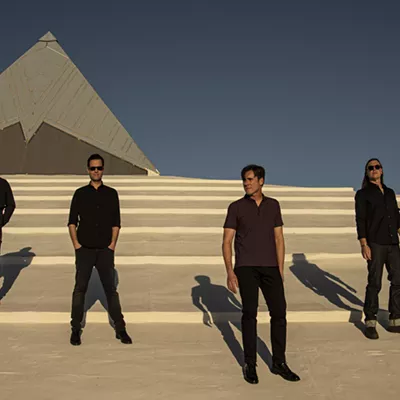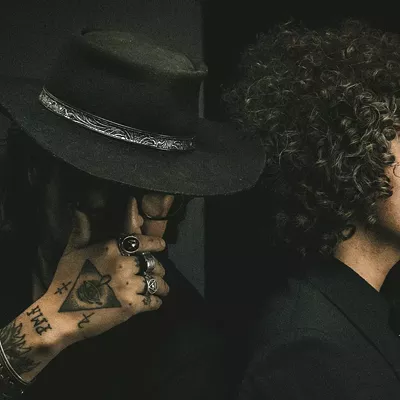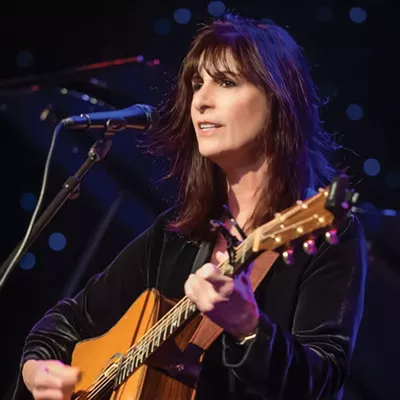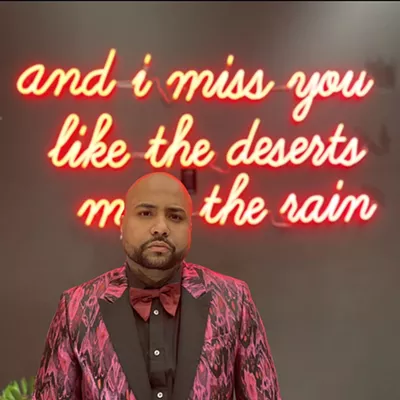One of Joe Bonamassa's favorite pastimes is driving.
"I like to drive real fast on the highway, alone and late at night," he said during a recent telephone interview from his adopted home of Los Angeles.
That description might also apply to the manner in which the guitarist-singer plays his signature brand of blues-rock: heavy on the throttle off the starting line, teasing the red line in the straightaway, and almost always exploding in an exciting finish. But the 33-year-old ax-man also knows when to lay back to elegantly hug tricky curves, and when to strategically drop into the lower gears and enjoy the scenery.
Which brings up the question: What kind of car does he drive?
"I'm not saying, because I don't want to lose the blue-collar audience," Bonamassa chuckled. "But it's made in Bavaria ... and the company also makes a good motorcycle."
Bonamassa and his band will play the Fox Tucson Theatre this Tuesday, Feb. 22. On the current tour, he's supported by longtime sidemen Carmine Rojas (bass) and Rick Melick (keyboards), as well as the band's latest addition, drummer Tal Bergman.
By now, many fans of blues, heavy rock and/or guitar virtuosi are familiar with Bonamassa's story.
Born in Utica, N.Y., in 1977, he was a guitar wunderkind, fascinated at age 4 with the playing of Stevie Ray Vaughan. He opened a show for B.B. King at 8, and he was headlining his own gigs at 12, with his parents and grandfather helping guide his early career.
Bonamassa said he attended a sort of rock school at home. His father, a guitarist and the owner of a guitar shop, usually dedicated each Sunday to a classic rock album.
"One weekend, it would be Genesis' Selling England by the Pound; the next week, it would be Yessongs, and then the one after that, it would be Todd Rundgren's Utopia."
Bonamassa signed his first record deal at 22 and saw the release of his debut album, A New Day Yesterday, in 2000. He's since released eight more studio albums and a few smokin' live records, most of them on his J&R Adventures label. The most recent was last year's acclaimed best-seller Black Rock.
A new album, Dust Bowl, will be released March 22. Melding Bonamassa's blues-rock with some down-home Americana, it features guest vocals by John Hiatt and Vince Gill. Especially tasty is a sassy duet by Hiatt and Bonamassa on Hiatt's tune "Tennessee Plates."
To his credit, Bonamassa has navigated handily the transition from child prodigy to full-grown man, developing an original style—a bit of Clapton, with some Hendrix, Vaughan and Jeff Beck—to complement his precocious and preternatural technique.
"You never stop trying to develop your own sound and put a stamp on it while paying tribute to your influences," he said. He cited other heroes such as Peter Green of the original Fleetwood Mac, Paul Kossoff from Free, B.B. King, Otis Rush, Albert King, Freddie King and Danny Gatton, from whom he used to take lessons.
The prodigy label dogs him a little, though. Many listeners still think of and refer to Bonamassa as a kid.
"You gotta keep moving forward," he said. "I'll be 34 years old this May, and I'm not that young anymore, and there's a whole generation coming up behind me. But some people, they still act like I'm 16."
That doesn't discourage him in the least, he said.
"Generally, people have longer careers in this type of music, and I am looking forward to one," he said. "The whole thing of having a little experience helps as well. When I was in my teens, I knew for sure that I knew it all. Now that I am older, I realize how much I still have to learn."
In addition to his thriving solo career, Bonamassa is a member of the rock supergroup Black Country Communion, which released its debut album last year. His partners in the project are bassist and singer Glenn Hughes, of Deep Purple and Black Sabbath fame; drummer Jason Bonham, son of late Led Zeppelin drummer John Bonham and a noted bandleader in his own right; and keyboardist Derek Sherinian, who has played with Dream Theater, Billy Idol and Alice Cooper, among others.
As one might guess from the lineup, the impetus behind Black Country Communion was to create a 1970s-vintage, heavy-rock record. "We weren't trying to update that sound, but capture it. We weren't trying to re-invent the wheel. We wanted to make a record that sounds like it came from 1972."
Some reviewers don't get it, though, Bonamassa admitted.
"This guy in Uncut magazine, I think, he just absolutely killed us. So—and I never do this—I got him on the phone and told him he totally missed the point and was criticizing us for doing exactly what we tried to do. I mean, we weren't trying to be the Arctic Monkeys, right? He said maybe I had a point, but I think he was just trying to get rid of me."
Bonamassa said Black Country Communion is planning a major tour, scheduled to kick off in June.
The Black Country Communion album was produced by South African hard-rock producer Kevin "Caveman" Shirley, who has helmed most of Bonamassa's releases. Shirley's many other credits include working with Aerosmith, Rush, the Black Crowes, Led Zeppelin, Iron Maiden and Slayer.
While on the subject of '70s rock, Bonamassa mentioned that he recently recorded a version of Tommy Bolin's song "Lotus" for a forthcoming tribute album to the legendary rock guitarist who died in 1976 after stints with Deep Purple and the James Gang. He also released two cult-favorite solo albums.
Unless you're talking about cars, it's tough to get Bonamassa to discuss anything other than music, guitars and guitarists.
"My whole life has been based on six strings and 21 frets. Playing music isn't really a job to me, because it's something I would do anyway. I have gotten to travel the world and play with so many people I admire, it's a real pleasure. And I am grateful anyone is even listening."













